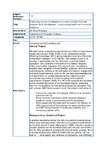Evaluating the use of enterprise to create synergies between graduate skills development, career management and successful induction
| dc.contributor | Hulme, S | |
| dc.contributor | Rutt, L | |
| dc.contributor.author | Pomeroy, R | |
| dc.contributor.author | Turner, R | |
| dc.contributor.author | Gray, C | |
| dc.contributor.author | Lintern, M | |
| dc.contributor.author | Goering, J | |
| dc.contributor.author | Swain, J | |
| dc.contributor.author | ||
| dc.contributor.author | ||
| dc.date.accessioned | 2018-09-07T12:18:51Z | |
| dc.date.available | 2018-09-07T12:18:51Z | |
| dc.date.issued | 2011 | |
| dc.identifier.uri | http://hdl.handle.net/10026.1/12244 | |
| dc.description | File replaced (incorrect version) on 14/9/2022 by KT (LDS). | |
| dc.description.abstract |
We planned an evaluative study into the use of the entrepreneurial visual planning tool ‘XING’ in the ‘FLUX’ competition format (Working Knowledge, 2011) during induction week at a University of Plymouth Colleges (UPC) Partner. This college is one of 18 working in partnership with the University to provide Higher Education (HE), primarily in the form of Foundation Degrees (FDs), in a Further Education (FE) environment. Foundations degrees were designed to bring together academic and vocational experiences by building on the principles of employer engagement and work-based learning. Entry to HE has been acknowledged as a stressful time for undergraduates as they adjust to a new educational environment, social groupings and academic expectations (Edward, 2003). For HE in FE students this transition has to consider the scope of the foundation degree, preparing them for the academic as well as the professional education they will undergo. With these issues in mind, the project itself aimed to: Explore the potential of employing XING to ease students’ transition into HE; Raise students’ awareness of the synergies between academic study, graduate skills and the workplace; Raise awareness amongst staff involved in the delivery of UPC programmes of the potential for using activities such as XING during induction to build peer networks and introduce graduate skills. Background to / Context of Project: A positive experience during the induction period is perceived as influencing undergraduates’ retention and academic achievement during their period of study (Hargreaves, 1998). Induction needs to prepare students for the transitions they will ( Hussey and Smith’s (2010). FDs, provided in primarily-FE environments, provide HE to a diverse student body (HEFCE 2006) with the need to fulfil the task of “… develop[ing] key skills and employability, and offer[ing] clear routes into the labour market …” whilst including academic-study to ensure the effectiveness of routes into “… further learning” (Blunkett, 2000). The highly conceptual nature of all of this poses risks for students’ perceptions of the value of their HE, which was born out in recent research where many UPC FD students did not appreciate the value of their course in relation to career development (Dismore et al, 2010). As recognised in the literature, there is therefore need to enhance support for students to make the link between academic study and employment (Hicks et al, 2009), as well as pedagogic research focus on these ‘non traditional’ student experiences (Leese, 2010). Two sources within the literature, Anderson and Krathwohl’s (2001) revised approach to cognitive taxonomy and Harvey et al’s (1997) report on graduate employability, have proved useful for identifying synergies between employability and academic study. Harvey et al’s (1997) three levels of employee contribution (‘adaptive’, ‘adaptable’ and ‘transformative’) align progressively with Anderson and Krathwohl’s (2001) cognitive processes, which in turn can be applied to two types of knowledge and skills: 1. subject specific, and 2. transformative, generic or abstract. The former is generally the purpose of assignments, the ‘task’, and the latter is generally incidental to that purpose (Cherney, 2008) and driven by the ‘prescribed approach’. One such approach, or particular interest is group work, which not only develops specific abstract attributes that align with social transitions but can also aid in academic and personal transitions, as described by “social-cultural theories” (Martin, 2005); a collective title for a breadth of theories supported in a wealth of literature as a factor in successful transition both into and through HE (Lave and Wenger, 1991; Tinto, 1993; Surowiecki, 2004; Edward, 2001; Mackie, 2001; Lund and Smørdal, 2006; Wheeler et al 2008; Leese 2010). Although it is not possible for cross-course induction activities to focus closely on subject specific knowledge and skills, due to obvious cognate differences and variations in requisite knowledge prior to any specific HE teaching, it is possible to focus on abstract, generic and transferable skills, their place in HE and the synergies with employability. XING is a visual planning tool that leads students through the key decisions in business planning, and a competition format which employs group work, idea generation, time constraints, communication with experts, and presentations through a focus on the commercialisation of ideas. Undertaken in an HE environment the objective is to align academic study with commercial awareness and the importance of developing abstract skills and attributes, which was the basis for this induction activity. | en_US |
| dc.description.sponsorship | TFAS | en_US |
| dc.language.iso | en | |
| dc.publisher | University of Plymouth | en |
| dc.subject | induction; foundation degree; employability; graduate skills; HE in FE; | en_US |
| dc.title | Evaluating the use of enterprise to create synergies between graduate skills development, career management and successful induction | en_US |
| dc.type | Report | en_US |
| plymouth.date-start | 2010-2011 | en_US |


